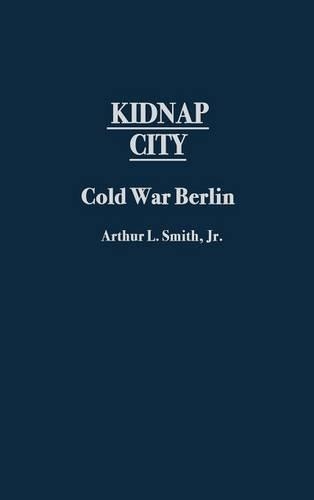
Kidnap City: Cold War Berlin
(Hardback)
Publishing Details
Kidnap City: Cold War Berlin
By (Author) Arthur L. Smith
Bloomsbury Publishing PLC
Praeger Publishers Inc
30th September 2002
United States
Classifications
Tertiary Education
Non Fiction
European history
Espionage and secret services
Political oppression and persecution
943.087
Physical Properties
Hardback
216
Description
Reveals the role of American intelligence agencies in the many West Berlin kidnappings after World War II. After more than 50 years, some of the secrets behind the post-war kidnappings in Berlin remain classified. Following Second World War, West Berlin residents found themselves as prime targets for kidnapping by communist agents. Lurid press accounts of these abductions left Berliners frightened and intimidated. The central connection of American intelligence agencies (CIC, CIA) to most of these cases, however, was not well known at the time. Delving into these various kidnapping cases, Smith discovers a distinct profile for the abductees. Almost all were former residents of East Germany and, as such, had an intelligence value for the Americans. This connection in turn made them prime targets for Soviet and East German intelligence units. Examination of the climate of fear in West Berlin reveals the complexity of politics in the early Cold War. Many targeted individuals had Nazi pasts--a factor that the Americans took great pains to conceal. At one point, the United States even risked a diplomatic rupture with West Germany when American authorities went so far as to block prosecutions of a German citizen in German courts for aiding in the kidnapping of a number of West Berliners. Exactly why Washington was so willing to go to extreme lengths in this case remains unknown, but Smith's research sheds new light on the clash between East and West in one troubled city.
Reviews
"Arthur L. Smith's well-written monograph covering Berlin in the 1945-1961 era is an interesting contribution to this ongoing process....[S]hould find a ready audience among scholars and students who seek a better understanding of American, Soviet, and East German intelligence agency activities in a city divided by fear and suspicion."-German Studies Review
Arthur L. Smith's well-written monograph covering Berlin in the 1945-1961 era is an interesting contribution to this ongoing process....[S]hould find a ready audience among scholars and students who seek a better understanding of American, Soviet, and East German intelligence agency activities in a city divided by fear and suspicion.-German Studies Review
Smith does a good job of describing the chilling effects of the kidnapping phenomenon and the troubled efforts of the British, American and West German authorities to control it....Smith's account of this phenomenon is clear, well researched and congent.-American History Review
Smith, author of seven previous books on some of the most stirring issues in German history from the 1930s to the 1950s, has contributed another well-researched and highly readable book that makes an important aspect of the Cold War come alive....the facts of the most famous Berlin espionage and abduction cases have come to light only since the opening of the East German archives and limited access to former Soviet records. This book is the first to bring all the most notable stories, their backgrounds, and the context of the broader international entanglements together....Recommended. All levels and collections.-Choice
"Smith does a good job of describing the chilling effects of the kidnapping phenomenon and the troubled efforts of the British, American and West German authorities to control it....Smith's account of this phenomenon is clear, well researched and congent."-American History Review
"Smith, author of seven previous books on some of the most stirring issues in German history from the 1930s to the 1950s, has contributed another well-researched and highly readable book that makes an important aspect of the Cold War come alive....the facts of the most famous Berlin espionage and abduction cases have come to light only since the opening of the East German archives and limited access to former Soviet records. This book is the first to bring all the most notable stories, their backgrounds, and the context of the broader international entanglements together....Recommended. All levels and collections."-Choice
Author Bio
Arthur L. Smith Jr. is Professor of History Emeritus, California State University, Los Angeles. He has published numerous articles and books on 20th-century Germany, as well as areas of German-American relations.
